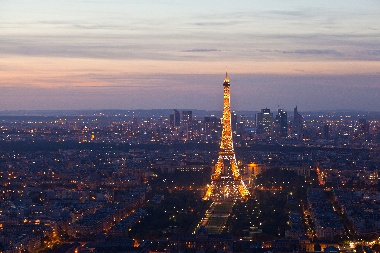
The lighting on the Eiffel tower is now swiched off at 1.00 am
Paris's standing as the City of Light may come under threat later this year if a decision to switch off the French capital's lights gets the go-ahead.
The French president,Francois Hollande and the energy minister Delphine Batho are in talks to turn lights off in and outside public buildings,shops and offices from 1.00 to 7.00 am.The switch-off would begin in July 2013.
Paris,along with other towns and villages in France,will face the measures in a move to improve energy efficiency by 20 per cent by 2020,an initiative proposed by the former president Nicolas Sarkozy.
In January 2012,a measure was passed that ensured that 3.5 million French businesses switched off any neon lights highlighting store names or logos.This took effect in July last year.
France's Association to Protect the Sky and Night Environment,which has participated in government talks to devise the project,says the law will help France to be more energy efficient.
However,some traders and merchants are unhappy with the idea.They say that,along with existing bans on night shopping and Sunday opening hours,the blackouts will affect businesses.
Claude Boulle,head of the City Centre Merchants Association,said many of the businesses choose to leave lighting on 24 hours a day as he says it has proven to be more welcoming for shoppers.
He said:"Also,lights from buildings and shops are part of public lighting and it brings security.Even if there aren't millions of people taking a stroll in the middle of the night,light still means security for those who are."
Boulle later added that the switch-off would diminish Paris's allure as a shopping destination when measured against London,Madrid or Berlin.
Currently,304 monuments,churches,statues,fountains and bridges in Paris are being turned off at night,including the Eiffel Tower at 1.00 am.The energy consumed by the Notre Dame cathedral has already been brought down from 54,000 Watts to 9,000 Watts.
Batho said:"One of our main objectives is to change the culture.We need to end the cycle of producing more because we are consuming more.There should be sobriety in energy use."





